- Home
- Augusten Burroughs
Magical Thinking
Magical Thinking Read online
MAGICAL THINKING
ALSO BY AUGUSTEN BURROUGHS
DRY
RUNNING WITH SCISSORS
SELLEVISION
MAGICAL THINKING
TRUE STORIES
AUGUSTEN BURROUGHS
ST. MARTIN’S PRESS NEW YORK
MAGICAL THINKING: TRUE STORIES. Copyright © 2004 by Island Road, L.L.C. All rights reserved. Printed in the United States of America. No part of this book may be used or reproduced in any manner whatsoever without written permission except in the case of brief quotations embodied in critical articles or reviews. For information, address St. Martin’s Press, 175 Fifth Avenue, New York, N.Y. 10010.
www.stmartins.com
Design by Phil Mazzone
Library of Congress Cataloging-in-Publication Data
Burroughs, Augusten.
Magical thinking / Augusten Burroughs.
p. cm.
ISBN 0-312-31594-5
EAN 978-0312-31594-8
1. Burroughs, Augusten. 2. Novelists, American—20th century— Biography. I. Title.
PS3552.U745Z472 2004
813'.6—dc22
[B]
2004046785
First Edition: October 2004
10 9 8 7 6 5 4 3 2 1
SOME NAMES HAVE BEEN CHANGED.
FOR ROBISONSERVICE.COM
CONTENTS
ACKNOWLEDGMENTS
COMMERCIAL BREAK
VANDERBILT GENES
TRANSFIXED BY TRANSSEXUALS
MODEL BEHAVIOR
I DATED AN UNDERTAKER
AND NOW A WORD FROM OUR SPONSOR
THE RAT/THING
DEBBY’S REQUIREMENTS
ROOF WORK
BEATING RAOUL
HOLY BLOW JOB
MARK THE SHRINK
TELEMARKETING REVENGE
MY LAST FIRST DATE
THE SCHNAUZER
KEY WORST
ASS BURGER
LIFE CYCLE OF THE NORTH AMERICAN OPOSSUM
CUNNILINGUSVILLE
I KID YOU NOT
I’M GONNA LIVE FOREVER
TOTAL TURNAROUND
ROID RAGE
MAGICAL THINKING
PUFF DERBY
MEANWHILE, BACK AT THE RANCH
UP THE ESCALATOR
ACKNOWLEDGMENTS
It takes an awful lot of work by a large number of people to turn what I write into a book. My deepest gratitude and thanks to: Jennifer Enderlin, Christopher Schelling, Sally Richardson, John Sargent, John Murphy, Gregg Sullivan, Frances Coady, John Cunningham, Matthew Shear, Matt Baldacci, George Witte, Carrie Hamilton Jones, Nancy Trypuc, Darin Keesler, Kim Cardascia, Edward Allen, Nicole Liebowitz, James Sinclair, Steve Snider, Steve Cohen, Christina Harcar, Kerry Nordling, Alison Lazarus, Jeff Capshew, Ken Holland, Merrill Bergenfeld, Andy LeCount, Tom Siino, Mark Kohut, Rob Renzler, and the entire Broadway sales force. Much appreciation to Dan Peres at Details magazine. And the folks at NPR’s Morning Edition. A few pieces in this collection originally ran on Salon.com in an earlier form, and I thank them for letting me publish them here. Thank you, Ryan Murphy and Mark Bozek. And thank you, Chip Kidd, for your beautiful covers. And K, what can I even say? I’d beat up anybody for you. With love for: John, Judy, Bob and Relda Robison, Haven Kimmel, Lawrence David, Suzanne Finnamore, Lynda Pearson, Millie Olson, Russell Nuce, Jon Pepoon, John DePretis, and Lori Greenberg. I am so happy to be in contact with David Machowski and Greg Fanslow again. Gratitude to Dr. Janet Zayas for suggesting the title of this book. And very special thanks to Norm Vexler for building us a beautiful, beautiful home, perfect to within 1/100th of an inch. Most of all, I want to thank Dennis Pilsits for just everything.
MAGICAL THINKING: A schizotypal personality disorder attributing to one’s own actions something that had nothing to do with him or her and thus assuming that one has a greater influence over events than is actually the case.
MAGICAL THINKING
COMMERCIAL BREAK
W
hen I was seven, I was plucked from my uneventful life deep in darkest Massachusetts and dropped into a Tang Instant Breakfast Drink commercial. It was exactly like being abducted by aliens except without the anal probe. I was a lonely kid with entirely imaginary friends. I played with trees.
Then, one day during penmanship class, a white van pulled up in front of our little gray schoolhouse, and the men from Tang climbed out.
My elementary school sat atop a low grassy hill in the center of Shutesbury, a small New England town that was so “small New England town” one had the sensation of existing within a snow globe at a souvenir shop. The mailboxes at the local post office had ornate brass doors with etched-glass windows. There was a white church with solid mahogany pews and a pipe organ. A small red library was tucked on the edge of the town square and carried books about local birds and field mice. It was retchingly quaint.
Of course, in this wholesome idyllic community, my school was the anchor. It was a gray clapboard building, two stories tall, with shutters. There was a steeple on top and inside a bell that worked. The door was bright red. There were two apple trees on either side. The playground consisted of a sandbox, two swing sets, and an area of blacktop on which was painted a hopscotch outline.
Now that I am an adult and have wasted much of my life as an advertising executive, I can easily imagine the conversation that must have taken place among the occupants of that van, upon their seeing my schoolhouse.
“So Cronkite was grilling the guy, you know? Just really asking the tough questions. Then they cut away to Nixon, and boy oh boy, you should have seen his face. It was li—”
“Jesus fucking Christ, Mitch. Get a load of that.”
“Huh? Oh, mother of fucking God. STOP THE VAN.”
“Christ, there’s even a bell on top.”
“Love those trees. But are those actually apples? Christ, yes, those are apples. The client’s gonna hate that. Apples clash with the orange flavor.”
“So we’ll cut ’em down and throw up a couple of maple trees. What’s the fucking difference?”
“You know, you couldn’t build a set this perfect in Burbank, you really couldn’t. This is so New England schoolhouse. We have hit pay dirt, gents. I think we’ve got a few triple martinis ahead of us tonight.”
I was sitting in Mrs. Ames’s tedious penmanship class looking out the window when the white van pulled into the circular driveway. I watched as a window was rolled halfway down and two lit cigarettes were tossed out. Then the doors opened, and the men stepped out.
Mrs. Ames noticed, too, because she paused in the middle of looping a D. When she turned her ancient neck to the window, my mind added the sound effect of a branch creaking under the weight of snow before it snaps. I was quite sure that Mrs. Ames was one of the original settlers of the town. She once said that television was “nonsense, just a fad like radio.”
Visitors were uncommon at our school. Especially visitors dressed in dark suits, wearing sunglasses, and carrying black briefcases. These were like the men who followed President Nixon around and whispered things in his ear.
“Remain seated and do not talk,” Mrs. Ames said, glaring at us down the point of her nose. “I shall return in a moment.” She quickly brushed her hands down the front of her heavy gray wool skirt to remove any wrinkles. She straightened the dainty single pearl that hung around her neck, centering it perfectly between her breasts, which were certainly bound with ace bandages beneath her crisp white shirt.
The group of men removed their sunglasses in unison, raised their chins in the air, and inhaled. I could tell they were inhaling because they slapped at their chests and flared their nostrils. It was a familiar gesture. Many of my mother’s friends from New York
City or Boston did the same thing when they came to Shutesbury. Personally, I could never understand why, because the air was thick with pollen and insects. If one wanted fresh air, why not just open the door to the clothes drier and stick your face in there?
One of the men approached the school, came right up to the window, and knocked on the wood next to the glass. “It’s real, all right,” he called back to his associates.
A moment later, Mrs. Ames joined the men outside and, to my horror, smiled. I’d never seen Mrs. Ames smile before, and the thought had never occurred to me that such an act was even possible for her. But there it was, her mouth open in the white daylight, her teeth exposed. One of the men stepped forward, removed his sunglasses, and said something to her. She touched her hair with her hand and laughed. Kimberly Plumme, who liked to insert marbles into her vagina at recess, said, “Gross.” Her lips frowned in disgust. I myself was horrified to see Mrs. Ames laugh. And then blush. To see her in such a state of obvious bliss was unbearable. I had to look away.
Eventually, Mrs. Ames walked back into the room, and I watched her legs, all plump and plastic-looking through her support hose. She wore high heels of an unfashionable style that made a sharp, angry sklack against the tile floor when she walked. She was kind only to the girls. And by “kind,” I mean she was not mean. She was punishing to the boys, even the prissy, girly boys like me. But for once, she had something to say that interested me.
“Children, children, may I have your attention please?” She clapped her hands together quickly. Smacksmacksmacksmacksmack.
But this was unnecessary because she already had our full attention. We’d been sitting there waiting for her, not daring to breathe lest we disturb the balance of the universe, causing her to fall and die and then not be able to tell us why the men had come to our school. Or worse: somehow cause the men to simply drive away.
“We have some very special surprise guests here today.” She looked to the door and nodded, and the men entered the room. “Hi kids,” they said. “Hi there, everyone.”
It was thrilling to hear them speak in their deep, baritone voices and to see, up close, the dark razor stubble that shadowed their chins. At the same time, an exotic aroma entered the room, one that made me feel light-headed and flushed, like I’d been on a pogo stick. Only as an adult would I be able to name this intoxicating scent: English Leather.
Mrs. Ames continued. “These men are from New York City. And I hope you all know where New York City is. Because we have studied our geography quite a bit this year. Does everyone here know where New York City is?”
We nodded yes, but we all thought, What’s the matter with you, crazy old witch? Why is your face so red?
Although it alarmed me to recognize that my own face was red, as well. Something about the presence of the men made both Mrs. Ames and me turn red and become hot. The fact that we had this in common made me wonder what was wrong with me.
“Good. Well, then. These men are here to make a television commercial.”
Here, I almost peed. She might as well have told me that as of today, I never had to come to school ever again and for that matter was free to hit anybody I wanted to, without being punished. I lived for television commercials. The only reason I watched TV was so that I could see the commercials. Faberge Organics Shampoo: “I told two friends. And they told two friends. And so on . . .and so on . . . and so on.” Or my current favorite: “Gee, your hair smells terrific!” I was also fond of the commercial with the dog chasing the chuck wagon underneath the kitchen sink: “It makes its own rich gravy.”
I watched one of the men scan the faces in the room. Occasionally he would jab his friend on the shoulder and nod in the direction of one of the students. As I was watching him he caught my eye and smiled. I thought he was a very friendly man, very nice. I admired his crisp dark suit, white shirt, and black tie. His hair was thick and glossy, combed back. I smiled at him. He nudged his friend and nodded in my direction, and then the other man looked at me. He smiled, too.
I wanted to jump up out of my seat and run to the men, hugging them around the legs. I wanted to lick the hair on their wrists.
Mrs. Ames announced to the class, “These men would like to use our schoolhouse in a commercial for their special beverage. It’s called Tang. Do any of you know Tang?”
There were gasps in the room. Of course we knew Tang, the orange crystalline powder that the astronauts brought with them to outer space. I loved Tang and would sometimes eat it by the teaspoon, straight from the jar. I loved the green label, the orange lid. The way the lid was extra wide and easy to unscrew. I even liked the paper eardrum that was over the mouth of the lid when you first opened the jar. You had to puncture the eardrum with a spoon, and printed on top was “Tang, Tang, Tang.”
My mother despised Tang. “I’ve just made this fresh tangerine juice and put it into this nice clay pitcher I bought at the Leverette Arts Center, and you want that god-awful artificial junk.” She did like cinnamon DYNAMINTS, though.
Mrs. Ames told us that the men from the van wanted to use some of us in their commercial. “Not all of you, now. Only some of you. They’re going to have to choose.”
Instantly, the students began raising their hands. Except for me. Some voice inside me said, “Don’t do it. It’s beneath you.” Instead, I sat politely at my desk with my hands clasped firmly together. I was very pleased that I’d thought to wear my fourteen-karat-gold electroplated ID bracelet that day. One thing was certain: I would be in their Tang commercial. And if any of the other children tried to get in my way, I would use my pencil to blind them.
“So these men would like to separate everybody into groups and then ask each group a few questions.”
Chaos erupted as the kids began to screech with excitement. Desks were shoved back, chairs knocked over. Mrs. Ames tried to gain control of her students by slapping her ruler against the edge of her globe. “Now, now, now, silence! Stop this! Children, come to attention at once!”
Reluctantly, the class came to attention, facing the flag and placing their hands over their hearts, ready to recite the Pledge of Allegiance.
“No, not that,” she said. “Just stand still and be silent.”
Eventually, we were split up into groups of three. Then group by group the men met with the kids.
I stared hatefully at the back of Lisa Tucker’s fat head. I was trying to determine where the odor she emitted was coming from. A hole? Some sort of vent for her brain? I hated Lisa, and so did everyone else. She smelled like feet and something worse, something spoiled and eggy. And she was mean. She was a strong girl who pushed the boys around. Her older brother, Tommy, was one of the big kids who went to the new school down the street. Once he hit me so hard he knocked the wind out of me. I wished that Lisa and Tommy would go swimming in the ocean and be eaten by Jaws. Surely the men would know not to cast her in their commercial.
When it was finally my turn, the men were tired, as evidenced by their loosened ties and the large wet spots that spread from under their arms. They’d spoken to all thirty kids and had notes splayed out on the table in front of them. They looked funny sitting in our small chairs, which had never seemed small before.
The man who had first smiled at me said, “Hi guys. So do any of you want to be in a commercial?” He looked at me when he said this, and I got the feeling that he had already chosen me. His eyes said, You are special and better than all the other children, and I would like you to come live with me and my blue eyes in a city far away from here. His eyes said, I will save you.
We all nodded our heads yes.
“Good then. Good. So what I want to do is, I want to see if you can laugh. I’m gonna tell you a joke, and I just want to see what you sound like when you laugh. Ready?”
The other children nodded, I thought, like puppets. I smiled and winked at him, like I’d seen people do on TV.
He winked back and nudged the man on his left.
“Okay,” he said. Then he rai
sed his voice and made a comical face. “Your mother wears army boots!”
Neither of the other kids laughed.
I tossed my head back in an explosion of delight and laughed so hard I was able to bring tears to my eyes. My face was flushed, my hands dripping with sweat from the pressure.
“Wow,” said the man. “You really liked that joke, did you?”
His friend turned to him. “Yeah, Phil, you’re a real laugh-riot.”
I quickly looked back and forth between the two men, but I wasn’t sure what was going on between them. Had I laughed before the punch line? Or was it a trick joke? Had I just blown my chance?
“Do you kids like Tang?” he asked.
The other two kids nodded grimly.
“I love Tang!” I gushed. “Only I like to make it with an extra scoop. Plus, you can put it in ice cube trays and then freeze it! That’s really good.”
Where had that come from? I’d never in my life frozen Tang.
“That’s great!” said the man with the blue eyes who was going to take me away to live with him in a penthouse apartment.
All of the men exchanged a look. Then my man said, “Thanks a lot, kids.”
Disgusting Evan and retarded Ellen immediately pushed their chairs back from the table and fled. But I was crushed, stunned, so I moved in slow motion, carefully rising from my chair. They might as well run over me with their white Tang van now, I thought.

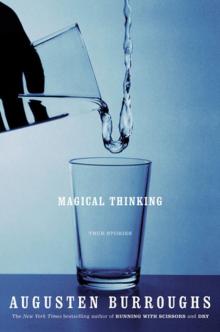 Magical Thinking: True Stories
Magical Thinking: True Stories A Wolf at the Table
A Wolf at the Table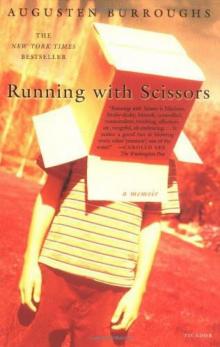 Running With Scissors
Running With Scissors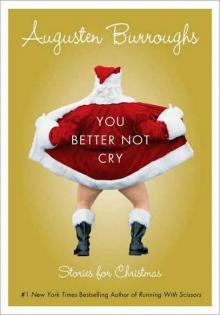 You Better Not Cry: Stories for Christmas
You Better Not Cry: Stories for Christmas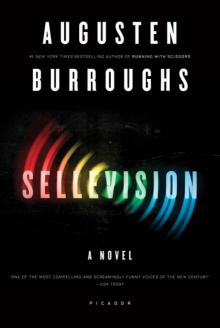 Sellevision
Sellevision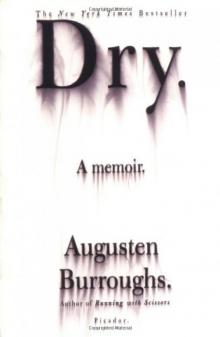 Dry
Dry Lust & Wonder
Lust & Wonder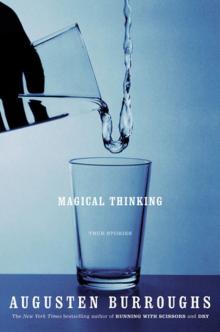 Magical Thinking
Magical Thinking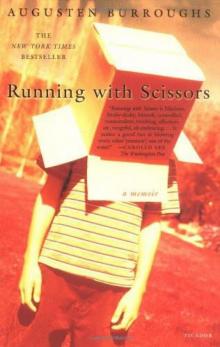 Running With Scissors: A Memoir
Running With Scissors: A Memoir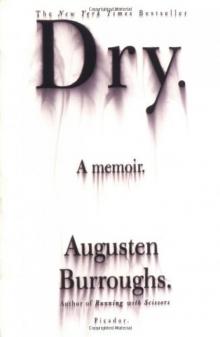 Dry: A Memoir
Dry: A Memoir